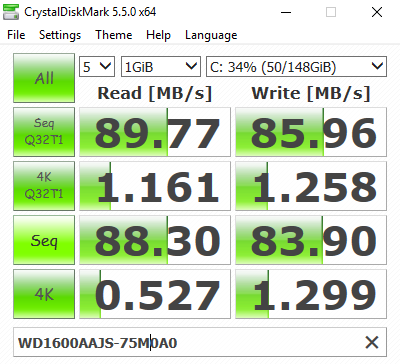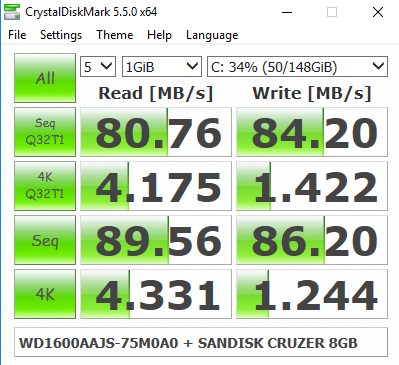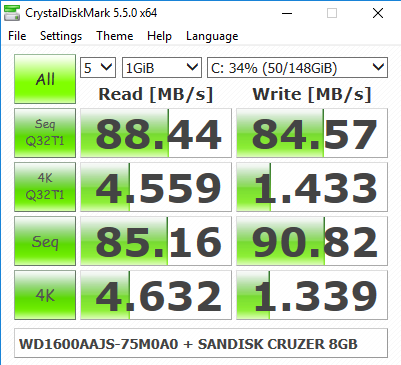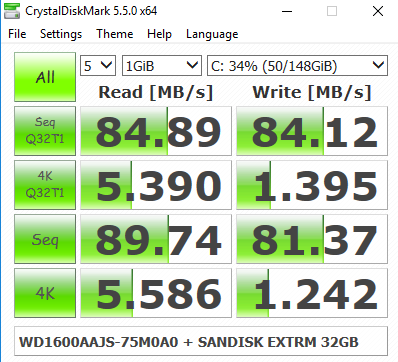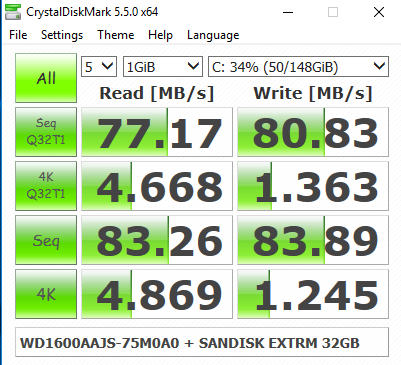Nope, they are not in RAID. I had the idea that I could use the second SSD to cache the green drive, to speed up the loading of the games I am currently playing. I thought ok, I may have 100/200Gb of game files but there's really no need to have all of that on a SSD ! So I just want a system that watch out which games I am playing at the moment and cache that. My green drive having a read speed of 80Gb/s and my SSD of 500Gb/s I would expect loading times to be 6 times faster, something I should notice. What do you think about that ?
There's a post here on romex's forum that suggest this is not the best way to go and I would be better with manually choosing the games I play to store them on the SSD and then have a 4Gb RAM drive and 64K block size. The problem with this proposition is the word "
manually" which doesn't appeal to me !
Here is the post: Tips needed to Create a Cache for PC Gaming My setup also have only 8Gb of ram, so anyway I cannot do RAM cache for the moment.
Your benchs are impressive. NVME+RAM Cache really gets to a totally different level !
As I am on a budget, then I would avoid NMVE cache or SSD storage for the time being, keeping to SSD cache and HDD storage. I should soon move to x99, so I will have 4x NVME available. Then for the future, If I get it correctly, I would buy a larger HDD for storage and the cheapest NVME I can get for cache. Does it sound like a good upgrade plan ? Can you feel any difference in gaming with RAM Cache ?
Thoose are the specs of my system drive:
-----------------------------------------------------------------------
CrystalDiskMark 5.2.1 x64
Advantech Industrial SSD 64GB MLC [SQF-S25M8-64G-S8C]
-----------------------------------------------------------------------
* MB/s = 1,000,000 bytes/s [SATA/600 = 600,000,000 bytes/s]
* KB = 1000 bytes, KiB = 1024 bytes
Sequential Read (Q= 32,T= 1) : 551.515 MB/s
Sequential Write (Q= 32,T= 1) : 104.184 MB/s
Random Read 4KiB (Q= 32,T= 1) : 115.831 MB/s [ 28279.1 IOPS]
Random Write 4KiB (Q= 32,T= 1) : 37.295 MB/s [ 9105.2 IOPS]
Sequential Read (T= 1) : 476.680 MB/s
Sequential Write (T= 1) : 104.031 MB/s
Random Read 4KiB (Q= 1,T= 1) : 14.697 MB/s [ 3588.1 IOPS]
Random Write 4KiB (Q= 1,T= 1) : 36.815 MB/s [ 8988.0 IOPS]
Test : 1024 MiB [E: 0.0% (0.0/59.6 GiB)] (x5) [Interval=5 sec]
-----------------------------------------------------------------------
CrystalDiskMark 5.2.1 x64
Advantech Industrial SSD 64GB MLC [SQF-S25M8-64G-S8C]
-----------------------------------------------------------------------
* MB/s = 1,000,000 bytes/s [SATA/600 = 600,000,000 bytes/s]
* KB = 1000 bytes, KiB = 1024 bytes
Sequential Read (Q= 32,T= 1) : 547.338 MB/s
Sequential Write (Q= 32,T= 1) : 103.896 MB/s
Random Read 4KiB (Q= 32,T= 1) : 112.046 MB/s [ 27355.0 IOPS]
Random Write 4KiB (Q= 32,T= 1) : 34.973 MB/s [ 8538.3 IOPS]
Sequential Read (T= 1) : 516.116 MB/s
Sequential Write (T= 1) : 103.817 MB/s
Random Read 4KiB (Q= 1,T= 1) : 18.524 MB/s [ 4522.5 IOPS]
Random Write 4KiB (Q= 1,T= 1) : 34.443 MB/s [ 8408.9 IOPS]
Test : 100 MiB [E: 0.0% (0.0/59.6 GiB)] (x5) [Interval=5 sec]
And here is the second SSD, welcome back to the past

-----------------------------------------------------------------------
CrystalDiskMark 5.2.1 x64
Samsung 475 64GB
-----------------------------------------------------------------------
* MB/s = 1,000,000 bytes/s [SATA/600 = 600,000,000 bytes/s]
* KB = 1000 bytes, KiB = 1024 bytes
Sequential Read (Q= 32,T= 1) : 275.393 MB/s
Sequential Write (Q= 32,T= 1) : 180.117 MB/s
Random Read 4KiB (Q= 32,T= 1) : 130.787 MB/s [ 31930.4 IOPS]
Random Write 4KiB (Q= 32,T= 1) : 40.736 MB/s [ 9945.3 IOPS]
Sequential Read (T= 1) : 259.874 MB/s
Sequential Write (T= 1) : 179.308 MB/s
Random Read 4KiB (Q= 1,T= 1) : 17.687 MB/s [ 4318.1 IOPS]
Random Write 4KiB (Q= 1,T= 1) : 40.236 MB/s [ 9823.2 IOPS]
Test : 1024 MiB [E: 0.2% (0.1/59.6 GiB)] (x5) [Interval=5 sec]


